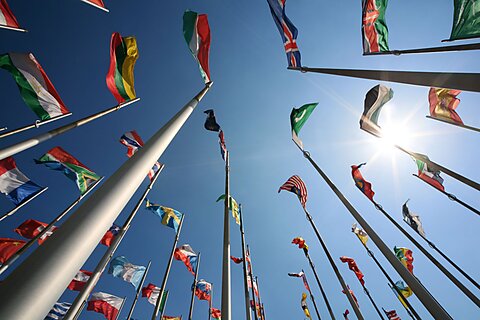
James Bacchus
In a joint appearance last Friday with Director‐General Ngozi Okonjo‐Iweala of the World Trade Organization at the Center for Strategic and International Studies in Washington, U.S. Trade Representative Katherine Tai tried to reassure those who care about international trade of the strength of the commitment of the Biden administration to the WTO.
This would be reassuring if not for the fact that Tai also continues to perpetuate wrongful myths about the WTO and its supposed unfairness towards the United States, myths that I address in a new essay published today as part of Cato’s Defending Globalization project.
“The United States is committed to the organization and its foundational goals and values,” Tai insisted, and is “proud to champion the international rules‐based order and the multilateral trading system.” WTO reform, however, is much needed, she added, and, in contemplating this needed reform, “we all need a WTO focused on its foundational goals.”
This affirmation of the support of the Biden administration for the WTO was, however, called into question by the almost simultaneous publication by Politico of an interview with Ambassador Tai before her speech, in which she said, “I don’t have enough time and money to waste resources in Geneva on a process that we don’t actually believe in.”
In context, it appears she meant to say that she would not be investing energy and resources in an institution in which she did not believe. But those who question the truth of her commitment and that of President Joe Biden to the WTO‐based multilateral trading system can perhaps be forgiven for thinking she may have meant something else.
While making some good points about the need for reforms that align trade more with climate change and other aspects of sustainable development and that create more transparency in the WTO and its workings, Tai said, “The WTO and the multilateral trading system’s rules were never meant to be immutable or static.”
True enough. The original idea was for the WTO to be an ongoing framework and forum for revising existing rules and negotiating new rules as the world needed. But WTO rules were meant to be binding. And like the Trump administration, the Biden administration does not seem to believe the United States is bound by WTO rules.
Tai rightly criticized trade‐distorting subsidies of other “certain Members”—by which she later acknowledged she meant China. But what of our own actions? The Inflation Reduction Act (IRA) includes a spate of subsidies that may or may not be consistent with binding WTO rules, and certainly are not to the extent that they are coupled with “Buy American” domestic content requirements, which are prohibited under those rules.
She did not mention the IRA in her speech, nor did she mention the half dozen WTO cases in which unilateral tariffs imposed by the Trump administration on Chinese and other imports have been found by WTO jurists to be illegal under WTO rules—judgments the Biden administration has simply ignored.
In her speech, Tai accused the WTO of suffering from a “lack of restraint.” Equally, she bemoaned the way in which the WTO has supposedly diminished lawful “policy space” for members to take needed domestic actions and second‐guessed members’ legitimate security interests.
In her interview with Politico, she said that the WTO should avoid “holding its members back from exercising their rights—whether it’s on the essential security side or their right to develop, or to correct for deindustrialization.”
None of this is true. WTO jurists and other WTO members simply expect the United States to fulfill the trade obligations to which it agreed in the WTO treaty. And, to resort to a popular political retort these days, “what about” the lack of restraint of the United States itself when it comes to applying unilateral and discriminatory trade measures?
The hypocrisy of the Biden administration is most evident in WTO dispute settlement, which it has crippled by refusing to join other WTO members in appointing new judges on the trading system’s final tribunal of appeal, the WTO Appellate Body.
The goal of dispute settlement reform, Tai said, “is about providing confidence that the system is fair.” The US has presented no evidence that it is not fair. “The Appellate Body systematically overreached to usurp the role of Members themselves to negotiate and create new rules. And in so doing, it undermined the ability of all Members to defend their workers from harmful non‐market policies.”
“Systematically overreached?” This is, to borrow her word, very much a rhetorical overreach. Why, we might ask, have none of the 163 other members of the WTO said that the Appellate Body engaged in “systematic overreach.” Put simply, it is because it did not.
The US has presented no evidence that the dispute settlement system is not fair to Americans. For the most part, the US has simply lost a number of cases it should have lost because it wanted to apply anti‐dumping duties, anti‐subsidy duties, and other trade remedies beyond what the WTO rules allow.
Have I mentioned that the United States played a major role in writing the current trade remedy rules during the Uruguay Round of trade negotiations, that we spent the previous several decades trying to get the rest of the world to agree on rules for applying such remedies, and that, indeed, we insisted on many of them as they are written?
I should know. I was there, first at the USTR and later as a Member of Congress.
What we have here is an elaborate and prolonged charade for sheer protectionism—for unlimited trade remedies. Why? Because Biden, Tai, and others who are defending this indefensible position of the United States are afraid that if they profess anything less than full‐throated support for the maximum amount of discretionary latitude in applying trade remedies, then they will lose the upcoming national elections in protection‐minded Pennsylvania, Michigan, and Wisconsin—three key swing states that could decide who wins the presidency (and, for that matter, control of the Congress) in 2024.
Why won’t the president and his USTR be honest with us about this?
The United States has—after several years of recalcitrance on the subject—recently finally acknowledged that it wants to abolish the Appellate Body and eliminate the current automatic right of appeal. The rest of the members of the WTO continue to favor a two‐tier system with an automatic right of appeal.
When asked by the CSIS moderator what the dispute settlement system should look like, she did not answer, although she did say she thought an outcome on dispute settlement reform at the upcoming 13th Ministerial Conference of the WTO in Dubai in February is “in the realm of possibility.” Let us hope so—so long as it does not include a restored Appellate Body shorn of the independence and impartiality that are essential to its success in helping uphold the rule of law in world trade.
In response to all this, Dr. Ngozi demurred on the question of the Appellate Body. That is, after all, a matter for the WTO to resolve, not the Director‐General. Yet, she politely pointed out that between 1995 and 2022, real per capita incomes in wealthier countries rose by about 50 percent, while in emerging markets and developing economies it increased by over 140 percent, from a much lower base.
As a recent issue of The Economist highlighted, the US has been the fastest growing major advanced economy over that period. Peterson Institute research estimates that between 1950 and 2016 trade expansion raised US incomes by over $7,000 per capita, or $18,000 per household. Simply put, Americans have profited enormously from trade and from membership in the WTO.
She also put into context the much over‐cited “China shock” report some years back by David Autor and his co‐authors, who told the world that increased exposure to imports from China explains more than a third of the manufacturing job losses in the United States between 1999 and 2011, some 2 million to 2.4 million jobs.
In addition to overlooking the fact that it is the adoption of automation and not trade that has accounted for a considerable majority of the job losses in US manufacturing, the Autor report—as its authors acknowledged at the time—tells only half of the trade story.
The other half of the story is this, as the Director‐General indicated: Robert Feenstra at UC‐Davis and Akira Sasahara at Keio University in Tokyo indicate that between 1995 and 2011, while increased goods imports from China eliminated 2 million jobs in the United States, increased exports to China and elsewhere added 6.6 million jobs to the US economy, 4 million of them from higher‐services exports.
In their overall trade policy, Tai, the president, and his administration are proceeding from a bogus economic premise. Like the Trump administration before them, they are also being less than candid with the other members of the WTO and with the American people about the source of their animus against the Appellate Body. Little wonder few have been persuaded by Ambassador Tai’s assertion that the Biden administration supports the WTO. Actions do speak louder than words, especially in Washington.
President Biden emphasized at the United Nations this week, “We’re going to continue our efforts to reform the World Trade Organization and preserve competition, openness, transparency, and the rule of law while, at the same time, equipping it to better tackle modern‐day imperatives, like driving the clean‐energy transition, protecting workers, promoting inclusive and sustainable growth.”
Amen, Mr. President. I am ready to vote for you one more time. But you need to know, if your White House staff and cabinet members will not tell you, that this worthy goal cannot be accomplished while your administration continues to undermine WTO dispute settlement by perpetuating the big lie that the system has been unfair to the United States of America. It has not. You should know it. And you should say it for all to hear.
My explanation of these and some other myths about the WTO that abound within the Washington Beltway can be read in my contribution to Cato’s Defending Globalization Project, “The World Trade Organization: Myths versus Reality.”








